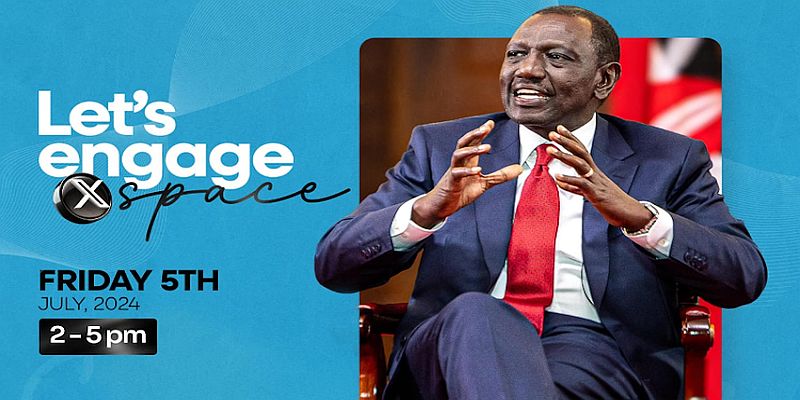Reflections on a Kenyan X Space on the GenZ Revolution

Prof. Kibwana cited a poignant example of a Kenyan youth who was contemplating suicide due to unemployment and saw a welcome opportunity for “aided suicide” by joining the ongoing GenZ protests to dare live bullets from anti-riot police.
We must admit that the youth despair arising from socio-economic pressures in Kenya has joined as another critical crisis in the so-called Age of Polycrisis.
GenZ and the Age of Polycrisis
Prof. Kivutha Kibwana, a well-known scholar, human rights activist and policymaker, was hosted in the Kenyan X Space on July 9th, 2024, where he engaged on the key issues raised through the ongoing GenZ revolution and protests against bad leadership in Kenya. He cited a poignant example of a youth who was contemplating suicide due to unemployment and saw a welcome opportunity for “aided suicide” by joining the ongoing GenZ protests to dare live bullets from anti-riot police. Reflecting keenly on how the deliberations progressed, we must admit that the youth despair arising from socio-economic pressures has joined as another critical crisis in the so-called Age of Polycrisis.
Kenya at a Crossroads, Navigating the Ring of Fire
Kenya stands at a critical crossroads, with her growing youth population caught between the promise of a digital revolution and the perils of economic disenfranchisement. The plight of unemployed and stressed GenZs, daring the guns due to unemployment, despair and destitution, mirrors a broader global crisis. This problem draws stark parallels to the Pacific Island States, where youth suicide rates have been high due to relentless economic pressures and the eventual loss of hope and happiness among the youth. As the founder of IBD put it in a LinkedIn article after speaking at the Inaugural Pacific Skills Summit held in Suva, Fiji, in June 2019, “Metaphorically sitting on the ‘Ring of Fire’ is any country which is unprepared to equip her growing youth population with relevant and resilient skills, for which she will have to contend with the fiery consequences of a youth bulge. Woe to such a country, because the unstoppable wave of labour market transformation borne out of the digital revolution will be nothing less than a sweeping hurricane.” (Link here). Kenya, with her massive youth demographic, epitomises this “Ring of Fire” scenario. The country’s future hinges on how effectively it addresses the needs and aspirations of her young population. Currently, the situation is dire: high unemployment rates, inadequate mental health support, and an increasingly expensive education system producing an oversupply of graduates the market is not prepared to absorb are fuelling youth unemployment and a sense of hopelessness among the youth.
Furthermore, the book “The Future of Africa in the Post-COVID-19 World” (accessible here) highlights that 40% of Africans are under 15, compared to the global figure of 40% under 25. This demographic reality positions Kenya as the epicentre of a youth-driven revolution for a sustainable and hopeful future. Klaus Schwab’s concept of an “era of talentism” is particularly relevant here, powering advocacy for talent-based socioeconomic empowerment, quality and affordable education, civil liberties, self-determination, and happiness.
Economic and Educational Imperatives
Kenya must urgently invest in economic opportunities and education to mitigate these challenges. The labour market transformation, driven by the digital revolution, demands a workforce equipped with modern and adaptive skills. As highlighted in the insightful LinkedIn article, lifelong skills development and universal access to quality education are pivotal. The article underscores the importance of continuous learning and skills development to keep pace with the rapidly evolving job market.
Mental Health and Community Support
Besides economic and educational reforms, Kenya must prioritise mental health support. Accessible mental health services and widespread awareness campaigns can help youths cope with stress and anxiety. Community support programs that engage young people in positive activities and provide a sense of belonging are equally vital. The Kenyan church, hopefully getting reformed in its youth engagement strategies, has a critical role to play here.
Policy Reforms and Youth Empowerment
Policy reforms are necessary to address systemic issues contributing to youth unemployment and stress. Policymakers must adopt innovative and inclusive approaches that resonate with GenZs, who are markedly different from previous generations. Empowered by modern education and borderless technology platforms, this “tribeless and fearless” cohort demands more than the outdated, linear solutions from the current ruling class.
Ultimately, Kenya’s political landscape is ripe for a GenZ revolution. This generation’s frustration with opulent and dismissive politicians who fail to address their unique needs is profound. The youth bulge represents not just a challenge but an opportunity for transformative change. By leveraging the energy and potential of her young population, Kenya can pave the way for a future where the majority enjoy the rights to talent-based socioeconomic empowerment, quality education, civil liberties, self-determination, and happiness.
Metaphorically, Kenya’s journey through the “Ring of Fire” requires a comprehensive fire-extinguishing strategy grounded in mental health support, economic opportunities, educational reforms, and policy innovation. The stakes are high, but with the right approach, the country can turn the youth bulge into a powerful force for positive change, ensuring a sustainable and hopeful future for all.
This is the product of more than a decade of dedicated experience in research, skills development, training, and mentorship. Through mentorship and career development fora, IBD empowers youth with the knowledge, international exposure, and digital fluency they need to be emancipated global citizens with borderless influence for sustainable development.
By Dr. Nashon Adero
